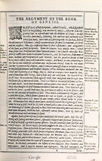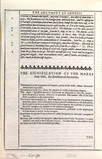THE ARGUMENT OF THE BOOK OF GENESIS.
§1. This first Book of holy Scripture, called Genesis, which signifieth birth or beginning, was written by Moyses, when he was designed by God to instruct and rule the children of Israel: As also the other four books following. The Author and authority of all which five books were ever acknowledged by the faithful both of the old and new Testament: and so accounted and esteemed by tradition, until Christ and his Apostles: who also confirmed them by their testimonies and allegations of the same, as of holy Scriptures. From the creation until Moyses wrote (which was above two thousand and four hundred years) the Church exercised Religion by revelations made to certain Patriarchs, and by Traditions from man to man, without any Scriptures or Law written. But the peculiar people of God being more visibly separated from other nations, and many errors abounding in the world, God would for correction and confutation thereof have his will made further known to his children, and so remain amongst them in written record, by his faithful servant and Prophet Moyses. Who therefore declareth the Author and beginning of all things, that is, how all creatures were made by God, and of him have their being, and by him only are conserved. He teacheth expressly that there is one only God, against those that imagined and brought into the fantasies of men many Gods. That the whole or universal substance of heaven and earth, with their ornaments and accidents, were made in time; against those that thought the first foundation thereof had ever been. That God doth govern the same; against those that say, all is ruled by destiny or by the stars, and not by the continual providence of God. That God is a rewarder of the good, and a punisher of evil, which sinners seem either not to know, or grossly to forget. And that God created all for man’s use and benefit, which should make us grateful. Wherefore holy Moyses more particularly describeth the beginning of man; what he was at first; how he fell; how all mankind is come of one man: deducing the Genealogy of Adam, especially to Noe. Then how men being more and more defiled upon the earth. with wicked, especially carnal sins, were by Gods just wrath drowned with a universal flood.
§2. Again, how a few reserved persons multiplied the world anew. But this offspring also falling into many sins, especially Idolatry and spiritual fornication, as those of the first Age did to carnal offences, God still conserved some faithful and true servants. Of which Moyses especially pursueth the line of Noe by Sem his first begotten son. Then describeth the particular vocations, lives, manners, notable sayings, and noble facts, with sincere religion of Abraham, Isaac, Jacob, Joseph, and other holy Patriarchs: who lived before the written law. Likewise upon what occasion, and in what manner Jacob, otherwise called Israel, with all his progeny, descended from the Land of Canaan into Aegypt, and were there entertained. So this book containeth the history of two thousand three hundred and odd years. And it may be divided into eight parts. The first contains the Creation of Heaven and Earth, and other Creatures, and lastly of Man chapters 1 and 2. The second part is of the transgression and fall of man, and his casting out of Paradise, of multiplication of men, and of sin, though still some were just, of the general flood, that drowned all except eight persons, and few other living creatures of the earth, from the third chapter to the eighth. The third part is of the new increase and multiplication of the same, from eighth chap. to the eleventh. The fourth, of the confusion of tongues and the division of nations, in the eleventh chapter. The fifth relateth Abraham’s going forth of his country, God’s promise, that in his seed all Nations should be blessed, and the commandment of Circumcision, from the twelfth chapter to the 21st. The sixth part recounteth the progeny, and other blessings, especially the great virtues of Abraham, Isaac, and Jacob, from the 21st chapter to the 37th. The seventh part reporteth the selling of Joseph into Aegypt, his advancement there, from the 37th chapter to the 46th. The eighth and last part is of Jacob and his progenies going into Aegypt, their entertainment there, and of Jacob’s, finally of Joseph’s death, in the five last chapters.
Margin Notes
- §1. Genesis written by Moyses.
- §1. Always authentical.
- §1. So known by Tradition, confirmed by Christ, alleged also by the Apostles.
- §1. Religion revealed to special persons and so observed by traditions.
- §1. Why Scripture was written.
- §1. What Moyses specially showeth in this book.
- §1. Man most particularly described.
- §1. The right line from Adam to Noe.
- §2. The principal Patriarchs from Noe to the 12 sons of Israel.
- §2. This book divided into eight parts.
Margin References
- §1. Mat. 19. Heb. 11. Jacob. 2. 1. Pet. 2. 2. Pet. 2.
- §1. St. Aug. quest. vet & novi Testam. cap. 3.
- §2. Gen. 10.


